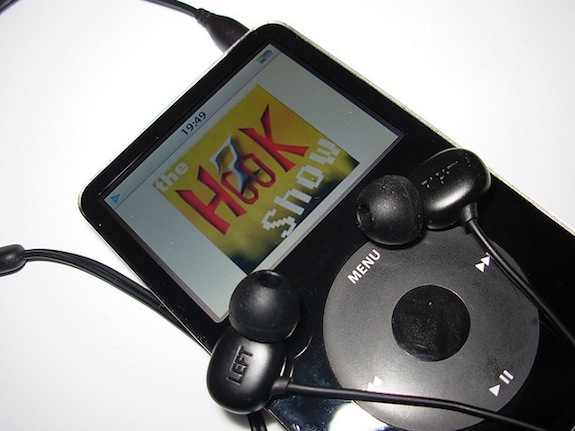Will One Patent Kill Podcasting?
There are thousands of podcasts to download, from sports to comedy to science. But one man says that all of them, all podcasts ever made, are infringing on his copyright
You might have heard of This American Life or Radiolab before. One of the ways these shows are distributed is through podcasts—radio segments that you can download and play whenever you want. There are thousands of podcasts to download, from sports to comedy to science. But one man says that all of them, all podcasts ever made, are infringing on his patent.
Jim Logan believes that he invented podcasting. He has sent letters to well-known podcasters like Marc Maron, Jesse Thorn and Adam Carolla explaining that they were stealing his invention. Here’s NPR:
Logan claims to have invented podcasting, with a company called Personal Audio, back in the mid-90s. He has a patent that he claims covers podcasting that has been recently updated but dates back to Oct. 2, 1996. That means, according to the letter his company sent out, every time someone creates a podcast — and distributes it — that person owes his company money.
The patent that Logan is referring to is US Patent 8,112,504. Here’s the abstract for that patent:
An audio program and message distribution system in which a host system organizes and transmits program segments to client subscriber locations. The host organizes the program segments by subject matter and creates scheduled programming in accordance with preferences associated with each subscriber. Program segments are associated with descriptive subject matter segments, and the subject matter segments may be used to generate both text and audio cataloging presentations to enable the user to more easily identify and select desirable programming. A playback unit at the subscriber location reproduces the program segments received from the host and includes mechanisms for interactively navigating among the program segments. A usage log is compiled to record the subscriber’s use of the provided program materials, to return data to the host for billing, to adaptively modify the subscriber’s preferences based on actual usage, and to send subscriber-generated comments and requests to the host for processing.
Here’s a translation, according to Personal Audio, Logan’s company:
The 1996 Personal Audio player incorporated a novel mechanism for automatically identifying and retrieving media files representing episodes in a series as those episodes became available. This mechanism was later widely adopted as the industry-standard technique called “podcasting.”
And since this patent was issued in 1996, anyone who participated in podcasting since then, owes Logan some money, according to his lawyers. And Logan’s company, Personal Audio, has used that patent as leverage in the past. The company sued Apple over the ability to create a playlist, and a jury decided Apple should pay them $8.5 million. After legal back and forth, they settled out of court.
And legally, Logan may be right. Anyone who’s ever podcasted has created something that is at least similar Logan’s patent. Here’s NPR again:
In the eyes of the law, it doesn’t matter that Logan’s company did not create iTunes or the iPod. “This is the road map,” his licensing guy, Richard Baker, says, “that would tell someone how to do podcasting, how to do MP3 players.” Even if the guy who had invented iTunes never read Logan’s patent, publicly available on the U.S. Patent website, “that does not matter,” Logan says.
This is one of many reasons why the patent system is commonly described as “broken.” This American Life has a now-fittingly named podcast about just this kind of patent problem called “When Patents Attack.” The argument that many, including President Obama, make, is that having a patent this broad and obvious hinders innovation, because anybody who might want to improve upon an idea or concept gets letters from patent attorneys. In his statement, Obama pointed out that people who “don’t actually produce anything themselves” are making money based on a model that allows them “to essentially leverage and hijack someone else’s idea and see if they can extort some money from them.”
For Logan, he uses money he makes from patents to make up for money he’s lost on failed businesses, according to NPR. “He says having a patent makes it safer for people like him to try to start their next new idea.” But it makes it less safe for anyone else to start a podcast.
More from Smithsonian.com:
When Patents Cramp Innovation
Five Epic Patent Wars That Don’t Involve Apple
/https://tf-cmsv2-smithsonianmag-media.s3.amazonaws.com/accounts/headshot/Rose-Eveleth-240.jpg)

/https://tf-cmsv2-smithsonianmag-media.s3.amazonaws.com/accounts/headshot/Rose-Eveleth-240.jpg)